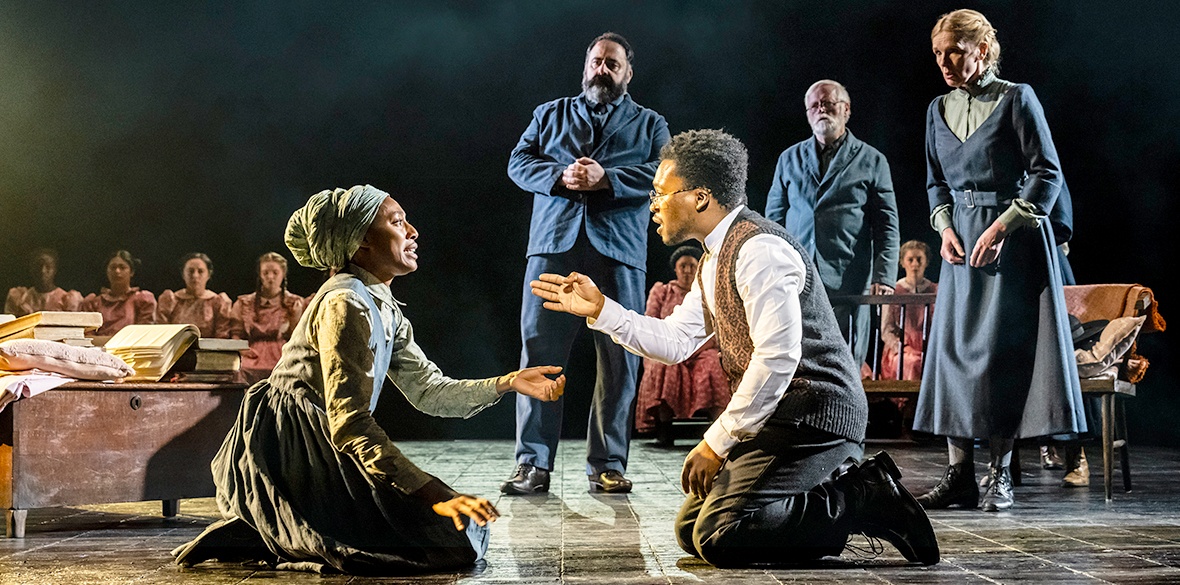This is the last article you can read this month
You can read more article this month
You can read more articles this month
Sorry your limit is up for this month
Reset on:
Please help support the Morning Star by subscribing here
The Crucible
National Theatre
PLAYWRIGHT Arthur Miller is a towering figure of the 20th century. The Crucible is one reason why.
Written in 1953, the play transports us to late 17th-century Massachusetts and the infamous Salem witch trials. It’s a magnificent tale, rooted in those early years of the American dream when the quest for religious tolerance and individual freedom clashed with the tyranny of the big idea and the spawning of new authority figures. The quintessential struggle between those who would impose order and obedience and those who instinctively fragment it is the source of all frenzy here.
But this is not a history lesson and Miller was concerned at the time not with the past but with his own and America’s present. His Salem story mirrors, in many respects, the surging witch-hunt of McCarthyism when communism was demonised as if it were the vomit of the devil himself.
The play is a parable. It exposes for us the terrifying consequence of power structures and their involuntary tendency to promote chaos while seeking order, and madness while professing reason. Collective delusion, it shows us, rocks us to the core and is apocalyptic. It is down to each new production to tailor this to a contemporary world.
Director Lynsey Turner should be in clover: she’s showing a masterpiece on the prestigious Olivier stage; today’s news – both foreign and domestic, as well as Twitter outbursts – are filled with Salem-style madness; audiences are crying out for enlightenment. The time is ripe. But…
The evening opens with a curtain of rain: an immediate distraction from a drama that cares not about the weather or scenic landscapes but wholly about a microcosm of human beings fermenting in a cauldron. Colourblind casting – a worthy and often drama-enhancing practice – confuses in a story so predicated on the facts of slavery and the introduction of evident “otherness” in the black Barbadian Tituba. Indeed, the casting generally seems committed to some vaguely populist agenda that has nothing to do with the clarity of the play.
While the women look fetching in their dresses and sing like gospel stars, they miss an open goal: in coverall Puritan bonnets and displaying the obeisance of the oppressed, we might have seen a modern Afghanistan and felt the shock. As it is, the point is lost.
Beautifully choreographed groups of actors decorate the stage, but revelatory body language seems stifled. Only the quivering lust of Erin Doherty as that fury from Hell, Abigail, and the pitch perfect character precision of Karl Johnson’s Giles Cory raise the game.
This production is an ensemble piece enacted as a spectacle, rather than a display of great acting that enables the audience to inhabit the play’s bedlam and live out the politics. Even the main Proctor couple give us no real catharsis.
Miller has written a play of unequivocal greatness that should bring us to boiling point. This production’s bland ‘let’s not offend anybody’ approach could not be less appropriate in a work with such piercing and targeted acumen.
Runs until November 5 2022, Box office: 020 3989 5455, nationaltheatre.org.uk.
The play will be captured in January and broadcast in cinemas from January 26 2023 (UK) and internationally from March 2 2023.










